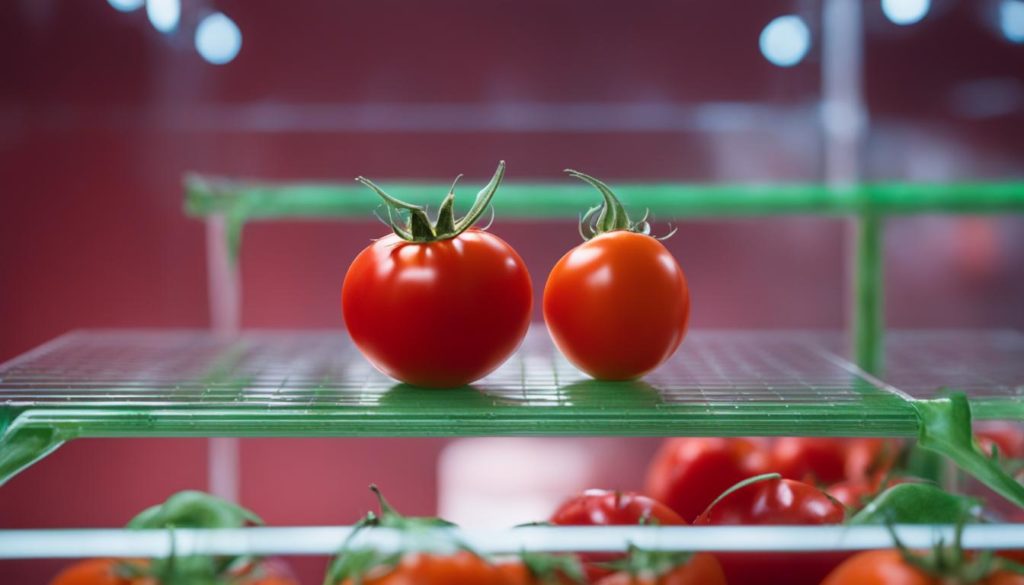Blockchain technology is revolutionizing the food industry by providing transparency and traceability in the food supply chain. It addresses the challenges of food safety and sustainability by creating a secure, tamper-proof digital record of each food product’s journey from farm to table. This technology improves traceability, prevents food fraud and contamination, and builds trust between consumers and producers. By leveraging blockchain, businesses can ensure the safety and quality of the food we consume.
Key Takeaways:
- Blockchain technology is transforming the food industry by enhancing transparency and traceability.
- It creates a secure digital record of each food product’s journey, preventing fraud and contamination.
- Blockchain improves trust between consumers and producers, ensuring the safety and quality of our food.
- With blockchain, businesses can achieve end-to-end traceability and better comply with food safety regulations.
- The adoption of blockchain technology fosters collaboration and data-driven decision making in the food supply chain.
The Problem: Food Safety and Traceability
The global food supply chain is complex, making it challenging to track and trace the origin and journey of food products. This lack of transparency can lead to foodborne illnesses and outbreaks, with millions of people falling ill and dying each year due to contaminated food. Traditional tracking methods are slow, inefficient, and prone to errors, increasing the risk of food fraud and mislabeling. Improved traceability and transparency are essential to solving these problems.
The Challenges of Food Safety
Food safety is a critical concern for consumers and businesses alike. The World Health Organization estimates that approximately 600 million people suffer from foodborne illnesses every year, resulting in 420,000 deaths. Contaminated food can lead to outbreaks of diseases such as salmonella, E. coli, and listeria, causing severe health issues and even fatalities. The lack of traceability in the food supply chain makes it difficult to identify the source of contamination, making it challenging to prevent and control these outbreaks.
The Importance of Traceability
Traceability is the ability to track and trace the movement of food products throughout the supply chain. It involves recording and documenting information about the product’s origin, processing, transportation, and storage. By having a transparent and traceable supply chain, it becomes easier to identify potential sources of contamination and take the necessary steps to prevent the spread of foodborne illnesses. Traceability also helps in removing contaminated products from the market quickly, minimizing the impact on public health and reputation of businesses.
| Foodborne Illnesses | Number of Cases (estimated) | Number of Deaths (estimated) |
|---|---|---|
| Salmonella | 93 million | 155,000 |
| E. coli | 265,000 | 3,000 |
| Listeria | 23,150 | 5,230 |
Ensuring food safety and traceability is not only crucial for protecting public health but also for maintaining consumer confidence. By implementing blockchain technology, the food industry can address these challenges and create a more transparent and secure supply chain. The next section will explore how blockchain technology provides a solution to enhance food safety and traceability.
The Solution: Blockchain Technology
Blockchain technology is the game-changing solution that can revolutionize the food industry by providing secure, transparent, and tamper-proof end-to-end traceability. By leveraging the power of blockchain, the food industry can create a digital “passport” for each food product, containing crucial information about its origin, processing, storage, and transportation. This information can be updated in real-time as the product moves through the supply chain, ensuring transparency and accountability.
Unlike traditional tracking methods that are slow and prone to errors, blockchain technology provides a decentralized digital ledger that records transactions in a secure and verifiable manner. Each transaction is linked to the previous one, creating an unalterable chain of blocks. This tamper-proof nature of blockchain ensures the integrity of the information stored on the ledger, making it virtually impossible to manipulate or falsify.
With blockchain technology, the food industry can overcome the challenges of traceability and transparency, making it easier to identify potential risks, prevent food fraud and contamination, and ensure the safety and quality of the food we consume. By adopting blockchain solutions, businesses can build trust with consumers, comply with food safety regulations, and protect their brand reputation.
The Benefits of Blockchain Technology in the Food Industry
- End-to-end traceability: Blockchain enables businesses to track and monitor food products from farm to fork, ensuring transparency and accountability throughout the supply chain.
- Data-driven decision making: The data stored on the blockchain can be analyzed to identify trends, potential risks, and optimize the supply chain, enabling businesses to make informed decisions.
- Collaboration and communication: Blockchain facilitates collaboration and communication between all participants in the food supply chain, enabling seamless sharing of product information and fostering a more efficient and transparent ecosystem.
- Improved brand management: By ensuring transparency and trust, blockchain technology helps businesses protect their brand reputation and demonstrate their commitment to safety and quality.
Blockchain technology holds the key to ensuring transparency and traceability in the food industry. As the demand for safe, sustainable, and ethical food products continues to grow, blockchain solutions will play a crucial role in shaping the future of the food industry.
| Benefits of Blockchain Technology | Description |
|---|---|
| End-to-end traceability | Enables tracking and monitoring of food products from farm to fork, ensuring transparency and accountability throughout the supply chain. |
| Data-driven decision making | The data stored on the blockchain can be analyzed to identify trends, potential risks, and optimize the supply chain, enabling businesses to make informed decisions. |
| Collaboration and communication | Facilitates collaboration and communication between all participants in the food supply chain, enabling seamless sharing of product information and fostering a more efficient and transparent ecosystem. |
| Improved brand management | Ensures transparency and trust, helping businesses protect their brand reputation and demonstrate their commitment to safety and quality. |
Benefits of Blockchain Transparency in the Food Industry
Blockchain transparency in the food industry brings numerous benefits that contribute to a safer and more trustworthy food supply chain. One of the key advantages is the establishment of transparency and trust among all stakeholders, including producers and consumers. By providing access to the digital passport of each food product, blockchain technology enables consumers to verify the authenticity, origin, and safety of the food they consume. This empowers consumers to make informed choices and enhances their confidence in the products they purchase.
In addition to transparency and trust, blockchain transparency also enables data-driven decision making in the food industry. The data stored on the blockchain can be analyzed to identify trends, potential risks, and areas for improvement. This allows businesses to make informed decisions that optimize their operations, enhance product quality, and ensure compliance with food safety regulations. By leveraging the power of data, companies can drive innovation and improve the overall efficiency and sustainability of the food supply chain.
“Blockchain transparency in the food industry builds transparency and trust between all stakeholders, from producers to consumers, by providing access to the digital passport of each food product.”
Furthermore, blockchain transparency facilitates collaboration and communication between all participants in the food supply chain. The decentralized nature of blockchain technology enables seamless sharing of information, making it easier for producers, suppliers, and regulators to collaborate and work towards common goals. This collaborative approach fosters stronger relationships, improves supply chain efficiency, and ensures the integrity and safety of the food we consume.
Table: Benefits of Blockchain Transparency in the Food Industry
| Benefit | Description |
|---|---|
| Transparency and Trust | Enhances trust among stakeholders by providing access to digital product passports for verification. |
| Data-Driven Decision Making | Enables analysis of blockchain data for identifying trends, risks, and areas for improvement. |
| Collaboration | Facilitates seamless sharing of information between participants in the food supply chain. |
| Brand Management | Protects brand reputation by ensuring compliance with food safety regulations and enhancing consumer confidence. |
Overall, blockchain transparency in the food industry holds immense potential to revolutionize food safety, traceability, and sustainability. By leveraging the benefits of blockchain technology, businesses can build trust with consumers, make data-driven decisions, foster collaboration, and effectively manage their brand reputation. As the demand for transparency and accountability in the food industry continues to grow, blockchain technology will play a pivotal role in transforming the future of food.
Blockchain Solutions for Transparent Food Systems
Blockchain technology has paved the way for innovative solutions in the food industry, offering transparency and traceability in the complex food supply chain. Several startups and organizations are leveraging blockchain technology to revolutionize the way food systems operate. These blockchain solutions enhance traceability, fraud prevention, and ensure the integrity of the food supply chain.
Startups Utilizing Blockchain Technology
Various startups have emerged as key players in utilizing blockchain technology to create transparent food systems. Companies such as Ripe.io, Trusty, TE-Food, Provenance, Agri-Chain, and Ucrop.it are harnessing the power of blockchain to improve traceability and ensure the quality and safety of food products.
These blockchain solutions enable businesses to track and monitor food products at every stage of the supply chain, from farm to fork. By leveraging blockchain technology, these startups aim to prevent fraud and foodborne illnesses, optimize the supply chain, and promote ethical sourcing practices.
Benefits of Blockchain Solutions
Implementing blockchain solutions in the food supply chain brings numerous benefits. Improved traceability and transparency provide consumers with access to detailed information about the origin, production, and processing of their food. This empowers consumers to make informed choices and ensures the safety and quality of the products they consume.
For businesses, blockchain solutions enable compliance with food safety regulations, protect brand reputation, and facilitate data-driven decision making. The transparent nature of blockchain technology fosters collaboration between all participants in the food supply chain, promoting trust and accountability among stakeholders.
| Benefits of Blockchain Solutions | Summary |
|---|---|
| Improved traceability | Enables consumers to access detailed information about the origin and processing of food products, ensuring safety and quality. |
| Fraud prevention | Prevents food fraud by providing a tamper-proof digital record of each food product’s journey. |
| Enhanced collaboration | Promotes trust and accountability by facilitating collaboration and communication between all participants in the food supply chain. |
Blockchain technology is revolutionizing the food industry by ensuring transparency, traceability, and trust. As more businesses adopt blockchain solutions, the food supply chain will become more secure and efficient, ultimately creating a sustainable and safe food industry.
The Role of Blockchain in Fostering Trust in the Food Industry

Blockchain technology plays a significant role in fostering trust in the food industry by providing transparency, traceability, and verifiable information about food products. With blockchain, consumers can access digital records and verify the origin, production process, and ingredients of the food they consume, ensuring its safety and quality. This transparency builds consumer confidence and enhances trust in the food industry.
Furthermore, blockchain enables food producers and suppliers to share product information with customers and regulators, demonstrating their commitment to transparency and food safety. By leveraging blockchain technology, they can provide irrefutable proof of compliance with industry regulations, ensuring that consumers can make informed choices about the food they purchase.
Blockchain transparency in the food industry builds trust between consumers and producers by providing access to verifiable information about the food we consume. It ensures that the claims made by food businesses are backed by transparent digital records, enhancing brand reputation and consumer confidence.
In addition to building trust, blockchain technology facilitates collaboration among all participants in the food supply chain. By sharing data on the blockchain, stakeholders can identify trends, potential risks, and opportunities for improvement. This data-driven decision making allows for proactive measures to be taken, further enhancing the safety and quality of the food supply chain.
Enhancing Brand Reputation and Ensuring Consumer Trust
Blockchain technology not only provides transparency and traceability but also contributes to brand reputation and ensures consumer trust. By enabling access to reliable and trustworthy information about food products, blockchain strengthens consumer confidence in the food industry as a whole. This trust is essential for businesses to thrive and for consumers to have peace of mind knowing that the food they consume is safe and of high quality.
In conclusion, blockchain technology plays a crucial role in fostering trust in the food industry by providing transparency, traceability, and verifiable information about food products. With blockchain, consumers can make informed choices and have confidence in the safety and quality of the food they consume. By leveraging this technology, food businesses can build brand reputation, enhance consumer trust, and ensure the long-term sustainability of the industry.
Ensuring Transparency in the Food Supply Chain with Blockchain Technology
The food supply chain is a complex network involving various stakeholders, from farmers and manufacturers to distributors and retailers. Ensuring transparency in this supply chain is crucial for maintaining food safety and consumer trust. Blockchain technology has emerged as a powerful solution to address this challenge, offering a secure and immutable ledger that tracks the journey of each food product.
By implementing blockchain technology, the food industry can achieve end-to-end transparency in the supply chain. Each food product is assigned a digital record or “passport” that contains detailed information about its origin, processing, transportation, and storage. This information is stored securely on the blockchain, making it easily accessible to consumers and stakeholders.
The use of blockchain technology also enables real-time tracking and traceability, making it easier to identify and prevent food fraud and contamination. Consumers can access this information through smartphone apps or by scanning QR codes, gaining greater assurance about the safety and quality of the food they consume.
Blockchain technology is revolutionizing the food industry by ensuring transparency in the supply chain and enhancing food safety. By leveraging this technology, businesses can build trust with consumers, prevent foodborne illnesses, and establish a more sustainable and ethical food system.
Table: Benefits of Blockchain Transparency in the Food Industry
| Benefits | Description |
|---|---|
| Enhanced Trust and Transparency | Blockchain provides access to digital records of food products, ensuring consumers can verify their authenticity and safety. |
| Data-Driven Decision Making | The data stored on the blockchain enables businesses to analyze trends, identify risks, and make informed decisions to improve food safety. |
| Improved Collaboration | Blockchain fosters collaboration and communication between stakeholders in the food supply chain, facilitating the sharing of information and best practices. |
| Brand Reputation Protection | By ensuring transparency, blockchain technology helps businesses protect their brand reputation by ensuring compliance with food safety regulations and ethical sourcing practices. |
Conclusion
In conclusion, blockchain transparency holds immense potential for revolutionizing the food industry, ensuring food safety, traceability, and sustainability. By harnessing the power of blockchain technology, businesses can establish end-to-end traceability, preventing foodborne illnesses and building trust with consumers.
The benefits of blockchain transparency in the food industry are numerous. It enables businesses to make data-driven decisions, identify trends and potential risks, and foster collaboration among all stakeholders. Additionally, it enhances brand management by ensuring compliance with food safety regulations and demonstrating a commitment to transparency.
As the demand for transparency and sustainability in the food industry continues to grow, blockchain technology emerges as a crucial tool. It facilitates the secure and tamper-proof recording of each food product’s journey, providing consumers with verifiable information about its origin, production process, and ingredients. By embracing blockchain transparency, the food industry can pave the way for a safer and more sustainable future.
Source Links
- https://www.linkedin.com/pulse/blockchain-food-safety-revolution-traceability-kalyanjit-hatibaruah
- https://www.ncbi.nlm.nih.gov/pmc/articles/PMC10230213/
- https://eatableadventures.com/blockchains-impact-on-food-safety-traceability/
- Customer Engagement and Loyalty: Innovating the Future of Saudi Arabia’s Dedicated Cargo Airline - December 23, 2024
- Regulatory and Compliance: Pioneering the Future of Saudi Arabia’s Dedicated Cargo Airline - December 21, 2024
- Financial Strategies: Fueling the Growth of Saudi Arabia’s Dedicated Cargo Airline - December 20, 2024






